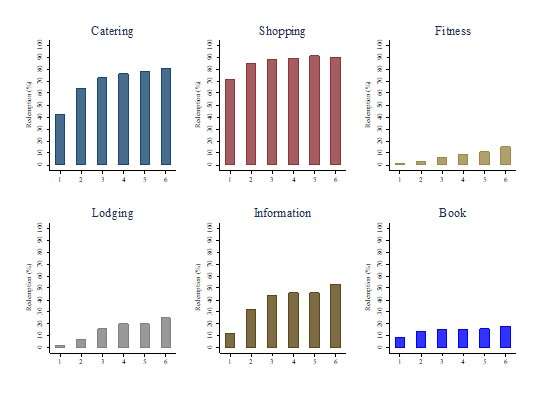Digital coupons can trigger shoppers to start spending again in times of recession

A number of service sectors were severely affected by the COVID-19 pandemic, including the catering, retail, tourism and entertainment industries. Globally, policy makers have introduced various initiatives to reinvigorate consumer spending. And, in China, digital shopping coupons have proved to be a popular measure for many local governments.
Unlike paper coupons and cash subsidies, these digital shopping coupons are dispensed through third-party digital payment platforms in China, such as Alipay, WeChat and Meituan. They typically work by offering a reduction when a certain final threshold is reached, e.g., $30 off a $90 purchase, and the idea is that they boost households' willingness to consume, giving firms the confidence to continue trading and retain employees. The costs of the vouchers are shared between local governing bodies.
In a study published in the KeAi journal China Economic Quarterly International, researchers in China explored how effective these shopping coupons were in helping merchants survive the pandemic recession. The study authors Yong Wang and Zhentao Yin, researchers at the Institute of Finance & Banking, Chinese Academy of Social Sciences, and Jianwei Xing, an assistant professor at the School of National Development, Peking University, focused on the city of Shaoxing, a prefecture of China's Zhejiang province with a population of 5 million.
The municipal government of Shaoxing, together with Alipay, released 180 million yuan worth of digital coupons to the public in six waves in 2020; 27.5 million yuan (500 yuan per citizen) was given to low-income groups, and 152.5 million yuan was provided in digital coupons covering the catering, lodging, shopping, fitness, book and information (cell phone) industries. All these coupons had to be used within Shaoxing, and each one was valid for seven days.
According to Wang, the digital coupons "generated positive and sustainable effects on the turnover and total sales of local catering and retail businesses, in particular. These positive effects were experienced by businesses of all sizes, but particularly large merchants. And they were not at the expense of spending in other categories."
The researchers found that the redemption rate of the Shaoxing coupons increased in each wave. Yin says, "It was only 38% for the first release, then it immediately rose to 60% during the second wave and eventually reached 70% in the sixth wave. After the first release of coupons on 3 April, the redemption rates for shopping and catering were the highest, 71% and 42%, respectively, followed by coupons for cell phones. Those for books, lodging and fitness had low redemption rates. By the last wave of coupons on 8 May, the redemption rates for shopping and catering had risen to 90% and 81%, respectively, while cell phones jumped to 53%."
The team conducted their study by reviewing mobile platform transactions. They examined high-frequency data, in other words, data that contain a very high number of observations, and they evaluated the effects of digital shopping coupons on catering and retail businesses specifically.
The purpose of their study was to gather data to help optimize the design of digital shopping coupons and determine the feasibility of adopting them as a normal fiscal policy tool. And they believe their findings provide empirical evidence that digital coupons are an effective policy tool for economic recovery.
Xing adds, "The study also suggests that reasonable rules should be set to direct more consumers to redeem coupons at small and mid-sized merchants, for example, by lowering the minimum purchase requirement for redeeming coupons and issuing cross-merchant redeemable coupons."
More information: Yong Wang et al, Can digitalized tools help stimulate the domestic economy? Evidence from the effects of digital coupons on merchant operation, China Economic Quarterly International (2022). DOI: 10.1016/j.ceqi.2022.08.005
Provided by KeAi Communications Co.



















